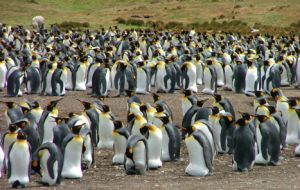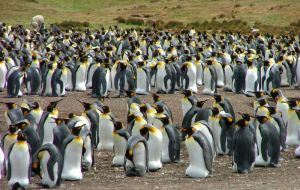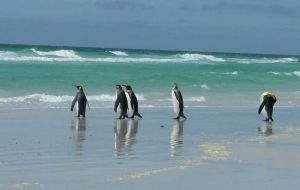MercoPress. South Atlantic News Agency
Falkland Islands King Penguin colony increasing
 King Penguins at Volunteer Point
King Penguins at Volunteer Point  Contrary to reports there are no King penguins in Antarctica
Contrary to reports there are no King penguins in Antarctica  The beautiful white sand beach next to the King Penguin colony
The beautiful white sand beach next to the King Penguin colony The first pair of King penguins to reside in the Falkland Islands stepped ashore at Volunteer Point, 30 miles north east of Port Stanley, in 1948.
The two penguins were spotted by Osmund Smith, who was a 28 year old shepherd at the time. Little did he realize then, that 60 years on, in 2008, he would be reaping the benefits of their descendants and making thousands of pounds annually from their prescence on the land which he now owns. Mr Smith, now aged 88, inherited Volunteer Point (his grandfather George Patterson-Smith emigrated from Scotland in 1870 and bought the land) some years ago, and he never imagined that people world-wide would be prepared to travel so far to view these magnificent and magestic birds. Unlike other species of penguins, which breed annually, KING penguins appear to lay an egg every 15-17 months, so accordingly only produce two chicks every 3 years. 60 years on the KING population at Volunteer Point today numbers just 2,000 as the build-up has been slow and laborious as initially very little protection from human interference was visible. Visitors wandered, unsupervised, among the penguins, and it was common to see up to 30 abandoned eggs daily. KING penguins do not begin breeding until they are 3 years old, although they outlive their counterparts (Gentoo, Magallanics, Rockhoppers) which die aged 10-12 years. The KINGS live to the ripe old age of 30. Some years ago a road was built to within 12 miles of Volunteer Point which encouraged an rapid increase in the number of visitors to the site. However it still requires a good 4x4 off-road vehicle and an experienced driver to traverse the final 12 miles to reach the penguins. The Falklands KING penguin colony is the most northern in the world and the most accessible. The remote island of South Georgia, 800 miles southeast of the Falklands, has a massive colony of half a million. Contrary to reports there are no KING penguins in Antarctica. 8 years ago Falklands Conservation obtained permission from Mr Smith to install a warden at Volunteer Point and almost immediately the effects were most evident. Keeping humans a safe distance from the breeding colony brought a massive reduction in the number of abandoned eggs. For many years the number of newly born KING penguin chicks hovered around 190-200 and never appeared to increase. For the past three years this figure has risen impressively to 500 newly born chicks annually. 3 years ago Mr Smith, very much aware of the need to protect the penguins, appointed his own wardens who are firm but friendly in their approach to visitors, and maintain the rules introduced by Falklands Conservation. Now as many as 3,000 people visit Volunteer Point during the season which runs from November until the end of March. An increase in the number of large cruise vessels visiting the Falklands, several of which stay all day in the Islands, allows as many as 120 tourists to take the two and half hours drive across to the KING penguin colony. It is not unexpected to see a convoy of 30-40 vehicles making their way over the grass track terrain to Volunteer Point when a cruise vessel visits Stanley. Conservationists strongly oppose suggestions that a road should be constructed to the location. Their objections are based on the possibility of a fleet of coaches, with as many as 500 visitors on board, journeying to Volunteer Point and causing massive disturbance to the endangered penguin colony. Mr Smith picks up a 15 pounds ($30US) a head from each visitor to the KING penguin colony, and this generates a tidy turnover of around 40,000 pounds annually. He has recently installed portaloos (toilets) and a cabin to provide weather protection for visitors to Volunteer Point. But as everyone realizes the protection of the KING penguin colony is paramount and every effort is being made to ensure their future. By a Special Correspondent at Volunteer Point.




Top Comments
Disclaimer & comment rulesCommenting for this story is now closed.
If you have a Facebook account, become a fan and comment on our Facebook Page!